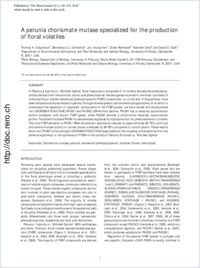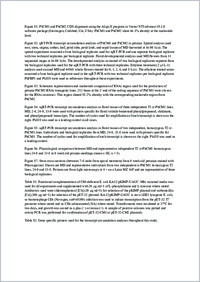A petunia chorismate mutase specialized for the production of floral volatiles
- Colquhoun, Thomas A. Department of Environmental Horticulture, and Plant Molecular and Cellular Biology, University of Florida, Gainesville, USA
- Schimmel, Bernardus C.J. Department of Environmental Horticulture, and Plant Molecular and Cellular Biology, University of Florida, Gainesville, USA
- Kim, Joo Young Department of Environmental Horticulture, and Plant Molecular and Cellular Biology, University of Florida, Gainesville, USA
- Reinhardt, Didier Plant Biology, Department of Biology, University of Fribourg, Switzerland
- Cline, Kenneth Horticultural Sciences Department, and Plant Molecular and Cellular Biology, University of Florida, Gainesville, USA
- Clark, David G. Department of Environmental Horticulture, and Plant Molecular and Cellular Biology, University of Florida, Gainesville, USA
-
09.11.2009
Published in:
- The Plant Journal. - 2010, vol. 61, no. 1, p. 145-155
English
In Petunia × hybrida cv. 'Mitchell Diploid' floral fragrance is comprised of 13 volatile benzenoids/phenylpropanoids derived from the aromatic amino acid phenylalanine. Several genes involved in the direct synthesis of individual floral volatile benzenoid/phenylpropanoid (FVBP) compounds, i.e. at the end of the pathway, have been isolated and characterized in petunia through reverse genetic and biochemical approaches. In an effort to understand the regulation of 'upstream' components in the FVBP system, we have cloned and characterized two CHORISMATE MUTASE (PhCM1 and PhCM2) cDNAs from petunia. PhCM1 has a transcript accumulation profile consistent with known FVBP genes, while PhCM2 showed a constitutive transcript accumulation profile. The plastid-localized PhCM1 is allosterically regulated by tryptophan but not phenylalanine or tyrosine. The total FVBP emission in PhCM1 RNAi knockdown petunias is reduced by approximately 60–70%, and total chorismate mutase activity in corolla tissue is reduced by 80–85% compared to control plants. These results show that PhCM1 is the principal CHORISMATE MUTASE responsible for the coupling of metabolites from the shikimate pathway to the synthesis of FVBPs in the corolla of Petunia × hybrida cv. 'Mitchell Diploid'.
- Faculty
- Faculté des sciences et de médecine
- Department
- Département de Biologie
- Language
-
- English
- Classification
- Biological sciences
- License
- License undefined
- Identifiers
-
- RERO DOC 17012
- DOI 10.1111/j.1365-313X.2009.04042.x
- Persistent URL
- https://folia.unifr.ch/unifr/documents/301477
Other files
Statistics
Document views: 91
File downloads:
- reinhardt_pcm.pdf: 150
- reinhardt_pcm_sm.pdf: 113

